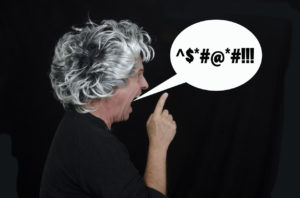The Importance Of Getting To "F*ck It"
I’ve watched a fascinating moment unfold in front of me three times recently, with three different clients.
For context, during our custom presentation training workshops, our clients typically deliver several versions of a practice talk. We often videotape their talks, play portions back, discuss what worked and what could be strengthened, and then repeat the process.
Our goal is to create a comfortable and warm environment in which it feels safe to make mistakes. Still, it’s not uncommon to work with a client who feels particularly anxious about delivering a practice talk in front of their peers, and whose early practice talks feel too restrained and tentative to be effective.
When that happens, we provide coaching intended to build their confidence. We might encourage the trainee to incorporate a new technique, try a new hook, or abandon their slides and speak extemporaneously.

But while that approach works for most people, it didn’t fully get those three clients where we wanted them to be. That’s when the interesting moment occurred.
When it was their turn to deliver their next practice presentation, each of the three reluctant speakers said the same thing just before beginning: “Okay, f*ck it.”
It’s little surprise that for each of the three speakers, the practice talk that immediately followed was their best.
The moment they used that phrase was the moment they decided to put their self-consciousness aside and go for it. Perhaps because they were upset (or even disgusted) with themselves for holding themselves back, those words gave them the permission they needed to be vulnerable—and become more effective.
If you find yourself relating to those three trainees, here are a few thoughts that might help:
Remember that feeling self-conscious and holding yourself back as a result is normal. But as you offer the audience only a portion of what you’re capable of, their response will remain muted, which will only accelerate your nervousness.
Flag the moment when you first recognize that you’re restraining or feeling disappointed with yourself. Recognize that you’re probably going to live with that feeling until you finally go for it—and that you can shortcut that dispiriting feeling by forcing yourself to do so sooner.
The moment you finally say “f*ck it,” there’s a strong likelihood that you’re going to deliver a much stronger version of your talk. The audience will probably respond favorably to it, rewarding your choice to go for it and giving you more confidence to continue.
Once you’ve experienced that feeling once, you’ll remember it. And that experience will make it easier to find and replicate your “f*ck it” moment even quicker before your next presentation.


